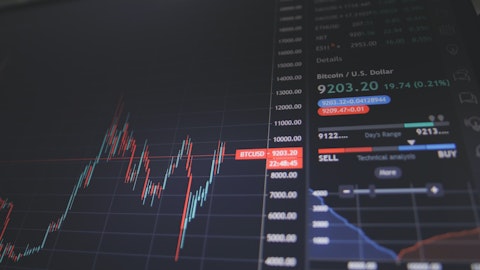In this article, we discuss 10 best India ETFs. If you want to skip our detailed discussion on the Indian economy, head directly to 5 Best India ETFs For 2024.
India’s economy saw its fastest growth in a year and a half at the end of 2023, fueled by strong activity in manufacturing and construction. This growth adds to Prime Minister Narendra Modi’s economic achievements ahead of the national election. As per Reuters, the country’s GDP expanded by 8.4% in the fourth quarter of 2023, exceeding expectations and the previous quarter’s growth of 7.6%. India has revised its growth forecast for the fiscal year to 7.6% from 7.3%. This strong economic performance could strengthen Modi’s reelection prospects, as he has focused on high economic growth in his campaign. Modi praised the December growth, saying it “shows the strength of Indian economy and its potential”. His government has increased infrastructure spending and offered incentives to boost manufacturing in different sectors, aiming to improve India’s competitiveness against countries like Vietnam and Thailand. In the December quarter, the manufacturing sector grew by 11.6%, investment growth exceeded 10% for the second quarter in a row, and the construction sector expanded by over 9%.
Sunil Kumar Sinha, economist at India Ratings, commented:
“The ongoing growth momentum is indicative of the Indian economy’s resilience, notwithstanding global headwinds.”
Moody’s, a global rating agency, upgraded India’s expected GDP growth for 2024 to 6.8%, up from 6.1%. The Economic Times mentioned that the agency expects India to lead G-20 nations in growth, with a projected GDP growth of 6.4% for 2025. Moody’s highlighted positive signs in India’s economy from late 2023 continuing into early 2024, including strong tax collections, increased auto sales, and confident consumers, indicating strong urban consumption. They also noted growth in manufacturing and services, suggesting a strong economy. Looking ahead, Moody’s mentioned that although private industrial spending has been slow, it is anticipated to improve due to benefits from diversifying supply chains and government initiatives like the Production Linked Incentive scheme. Additionally, 2024 is an election year for several G-20 countries including India, which could influence international trade, capital flows, and domestic policies related to industry and trade.
In 2023, there was a significant increase in investments into ETFs focused on Indian stocks, reaching $8.6 billion. According to Forbes, The NSE Nifty Index in India jumped by almost 20% in 2023, outperforming the MSCI emerging markets index, which rose by 7%. Varun Laijawalla, a senior portfolio manager at Ninety One, noted a major transformation in India over the past 5-6 years, driven by digitization, growing manufacturing, and a booming property and housing sector, supported by regulatory reforms and a growing middle class. The positive outlook for India has been highlighted before, with Morgan Stanley projecting India to have the third largest stock market by the end of the decade, surpassing Hong Kong and Japan. Ridham Desai, Morgan Stanley’s chief equity strategist for India, described India’s rise as a “once-in-a-generation shift and an opportunity for investors and companies.” Despite concerns about high prices, Malcolm Dorson, a senior portfolio manager at Global X, mentioned that Indian share valuations are in line with their historical average and have not increased much over the past two years.
India’s private equity sector has also matured substantially over the past decade, especially in the last five to six years. The restrictions on international private equity investment in China have led to increased interest in Indian deals among Asia funds. Many analysts, including Laijawalla and Dorson, see Prime Minister Modi as likely to win the upcoming national elections, providing a level of certainty for the market’s growth profile compared to China.
In this article, we discuss some of the best India ETFs that provide investors with access to stocks like Infosys Limited (NYSE:INFY), HDFC Bank Limited (NYSE:HDB), and ICICI Bank Limited (NYSE:IBN).

Photo by Smartworks Coworking on Unsplash
Our Methodology
We curated our list of the best India ETFs by choosing consensus picks from multiple credible websites. We have mentioned the 5-year share price performance of each ETF as of March 27, 2024, ranking the list in ascending order of the share price gains. It is important to note, however, that not all ETFs have been trading for 5 years. We have also discussed the top holdings of the ETFs to offer better insight to potential investors.
Best India ETFs For 2024
10. Matthews India Active ETF (NYSE:INDE)
5-Year Share Price Performance as of March 27: 12.87%
The Matthews India Active ETF (NYSE:INDE) aims to meet its investment goals by allocating a minimum of 80% of its net assets to publicly traded stocks, preferred stocks, and convertible securities of Indian firms. It mirrors the performance of the S&P Bombay Stock Exchange 100 Index. Launched on September 21, 2023, the ETF holds net assets worth $6.63 million as of March 26, 2024, with a gross expense ratio of 0.79%. Its portfolio includes 57 stocks as of March 27, 2024.
Reliance Industries Limited (NSE:RELIANCE) is the top holding of the Matthews India Active ETF (NYSE:INDE). Headquartered in Mumbai, India, the company produces hydrocarbons and manages different businesses globally, including textile, oils and chemicals, renewables, and financial services, among others.
In addition to Infosys Limited (NYSE:INFY), HDFC Bank Limited (NYSE:HDB), and ICICI Bank Limited (NYSE:IBN), Reliance Industries Limited (NSE:RELIANCE) is one of the best India stocks.
9. iShares India 50 ETF (NASDAQ:INDY)
5-Year Share Price Performance as of March 27: 31.96%
The iShares India 50 ETF (NASDAQ:INDY) aims to replicate the performance of the Nifty 50 Index, which comprises 50 of the largest Indian equities. It is one of the best India ETFs. Introduced on November 18, 2009, the ETF holds net assets amounting to $853.62 million as of March 26, 2024, with a portfolio consisting of 50 stocks. The fund offers an expense ratio of 0.89%.
HDFC Bank Limited (NYSE:HDB) is the largest holding of the iShares India 50 ETF (NASDAQ:INDY). HDFC Bank Limited (NYSE:HDB), based in Mumbai, India, offers banking and financial services to individuals and businesses across India, as well as in Bahrain, Hong Kong, and Dubai. On January 16, HDFC Bank Limited (NYSE:HDB) announced a Q3 revenue of ₹717.7 billion, an increase of 113.5% year-over-year, and a profit of ₹172.6 billion after paying taxes.
According to Insider Monkey’s fourth quarter database, 41 hedge funds were bullish on HDFC Bank Limited (NYSE:HDB), up from 38 funds in the last quarter. Andreas Halvorsen’s Viking Global is the largest shareholder of the company, with 9.74 million shares valued at $653.7 million.
Polen International Growth Strategy stated the following regarding HDFC Bank Limited (NYSE:HDB) in its fourth quarter 2023 investor letter:
“HDFC Bank Limited (NYSE:HDB) is the largest private sector bank in India. It has benefited from the strong growth of the Indian economy over the past two decades while taking significant share from its less well-run public-sector competitors. We expect these trends to remain in place for at least the next five years. More recently, HDFC Bank’s share price has stagnated after its merger with parent company, HDFC Ltd. After the completion of the merger in Q3 2023, the bank’s margins and returns on capital have deteriorated slightly, owing to its parent company’s higher cost of funding. We expect in the coming years, HDFC Bank will integrate its parent’s operations and replace its higher-cost funds with lower-cost deposits. If it continues to execute on its strategy well, then a period of outsized earnings growth could follow. Meanwhile, valuations trade at an attractive level of 17x forward earnings, a level not much above its 2008 low valuations. Given this, we increased our position to reflect a more full-sized position.”
8. Nifty India Financials ETF (NYSE:INDF)
5-Year Share Price Performance as of March 27: 37.46%
The Nifty India Financials ETF (NYSE:INDF), one of the best India ETFs, follows the Nifty Financial Services 25/50 Index, which mirrors the performance of different financial entities in India. The fund was launched on October 21, 2020. As of March 26, 2024, it holds net assets worth $7.83 million, with operating expenses at 0.75%. Its portfolio consists of 20 stocks.
ICICI Bank Limited (NYSE:IBN) is the top holding of the Nifty India Financials ETF (NYSE:INDF). It offers a range of banking products and services in India and globally. Its operations are divided into Retail Banking, Wholesale Banking, Treasury, Other Banking, Life Insurance, and Others segments. On January 20, ICICI Bank Limited (NYSE:IBN) reported a Q3 EPS of $0.35 and a revenue of $2.98 billion, outperforming Wall Street estimates by $0.01 and $26.16 million, respectively.
According to Insider Monkey’s fourth quarter database, 34 hedge funds were bullish on ICICI Bank Limited (NYSE:IBN), compared to 32 funds in the previous quarter. Rajiv Jain’s GQG Partners is the largest position holder in the firm, with 58 million shares worth $1.38 billion.
7. iShares MSCI India ETF (BATS:INDA)
5-Year Share Price Performance as of March 27: 44.81%
Next on our list of the best India ETFs is the iShares MSCI India ETF (BATS:INDA), which aims to reflect the performance of the MSCI India Index. It offers exposure to medium and large companies in India and provides targeted access to the stock market of India. The ETF was introduced on February 2, 2012. As of March 26, 2024, the fund holds net assets worth $8.95 billion, with a portfolio comprising 136 stocks. It has an expense ratio of 0.65%.
Infosys Limited (NYSE:INFY) is one of the top holdings of the iShares MSCI India ETF (BATS:INDA). Infosys Limited (NYSE:INFY) offers consulting, outsourcing, technology, and modern digital services in India, as well as globally. The firm is based in Bengaluru, India. On January 11, Infosys Limited (NYSE:INFY) announced a Q3 GAAP EPS of $0.18, in-line with estimates. Its revenue came in at $4.66 billion, falling short of market estimates by $10 million.
As per Insider Monkey’s fourth quarter database, 22 hedge funds were bullish on Infosys Limited (NYSE:INFY), up from 19 funds in the preceding quarter. Ken Fisher’s Fisher Asset Management held the largest position in the company, with 15.3 million shares valued at $281.2 million.
6. First Trust India NIFTY 50 Equal Weight ETF (NASDAQ:NFTY)
5-Year Share Price Performance as of March 27: 48.95%
The First Trust India NIFTY 50 Equal Weight ETF (NASDAQ:NFTY), previously known as the First Trust Taiwan AlphaDEX Fund, aims to match the performance of the NIFTY 50 Equal Weight Index. The ETF typically invests a minimum of 90% of its assets in the common stocks that make up the Index. It was launched on February 14, 2012, and as of March 26, 2024, the ETF has net assets amounting to $187.13 million, with its portfolio comprising 50 stocks. Its expense ratio is 0.80% as of May 1, 2023.
Bajaj Auto Limited (NSE:BAJAJ-AUTO) is the top holding of the First Trust India NIFTY 50 Equal Weight ETF (NASDAQ:NFTY). Bajaj Auto Limited (NSE:BAJAJ-AUTO) designs, produces, and distributes vehicles in India. Its operations are divided into Automotive, Investments, and Other segments. The company was established in 1945 and is headquartered in Pune, India.
Like Infosys Limited (NYSE:INFY), HDFC Bank Limited (NYSE:HDB), and ICICI Bank Limited (NYSE:IBN), Bajaj Auto Limited (NSE:BAJAJ-AUTO) is one of the best India stocks.
Click to continue reading and see 5 Best India ETFs For 2024.
Suggested articles:
- 11 Best April Dividend Stocks To Invest In
- Insiders Are Dumping These 10 Healthcare Stocks
- 20 US States with the Highest Electricity Consumption
Disclosure: None. 10 Best India ETFs For 2024 is originally published on Insider Monkey.





